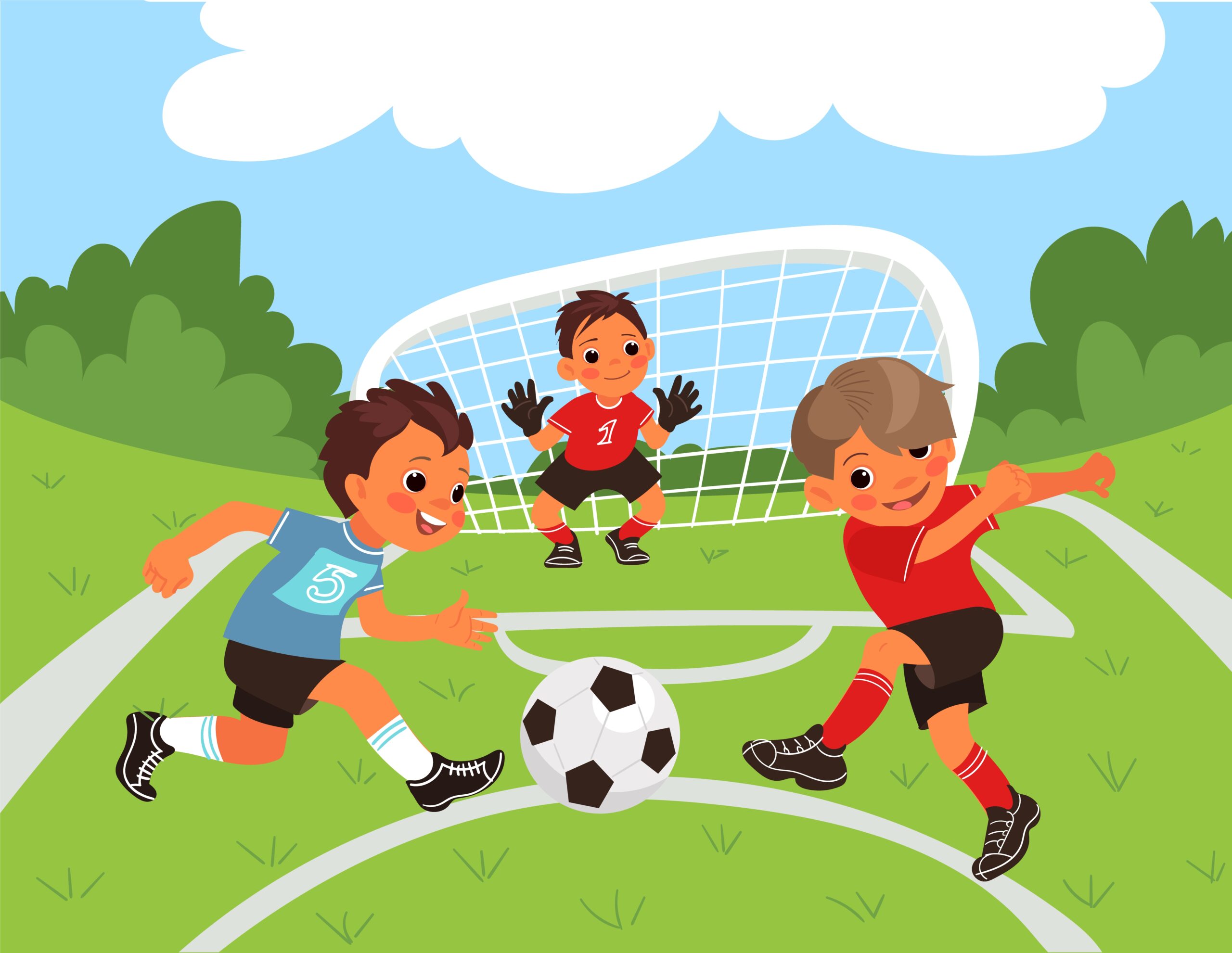English football, also known as association football or simply football, is the most popular sport in England. It is played by millions of people of all ages and abilities across the country. The English Football Association (FA), founded in 1863, is the governing body of football in England. The FA organises the top two levels of professional football in England: the Premier League and the English Football League (EFL). The Premier League is the top tier of English football and is contested by 20 clubs. The EFL is divided into three divisions: the Championship, League One, and League Two.
Also Read: Benefits of Sports for Students and Children
Football vocabulary words
Football: The name for the sport known as soccer in the United States, Canada, Australia, and a few other countries.
Pitch: The field where football is played.
Goal: The area each team defends and tries to send the ball into to score points.
Goalpost: The vertical posts supporting the crossbar in a goal.
Crossbar: The horizontal bar at the top of a goal.
Goalkeeper (Keeper, Goalie): The player who guards the goal.
Defender: Player positioned near the team’s own goal, which is the goal that the other team is trying to score in.
Midfielder: Player positioned in the middle of the field between the defenders and the forwards; often involved in both offensive and defensive actions.
Forward (Striker): Player positioned towards the front of the team’s formation who primarily works to score goals.
Formation: The arrangement of players on the pitch. It’s often described with three or four numbers, such as 4-4-2 or 4-3-3, representing the number of defenders, midfielders, and forwards, respectively.
Kick-off: The first kick of the game or of the second half. Also refers to the kick restarting play after a goal is scored.
Throw-in: When the ball goes out of bounds on the sideline, it’s thrown back into play by a player from the opposing team to the one that last touched the ball.
Corner Kick: A free kick from the corner of the pitch, given to the attacking team when the ball goes over the goal line last touched by a player of the defending team.
Penalty Kick: A free kick at the goal from the penalty spot, awarded to the attacking team after a foul by the defending team inside the penalty box.
Free Kick: A kick given to a team where the opposing team can’t be within 10 yards of the ball. Can be direct (goal can be scored directly) or indirect (goal can only be scored after another player touches the ball).
Offside: A player is in an offside position if they’re nearer to the opponent’s goal line than both the ball and the second last opponent when the ball is played to them. They will be penalised if they are involved in active play.
Foul: A breach of the rules, like handling the ball, tripping, pushing, striking an opponent.
Yellow Card: A caution shown to a player by the referee for unsportsmanlike behaviour, fouls, or other infringements. Two yellow cards in a match result in a red card.
Red Card: A card shown by the referee to signify that a player is being sent off and that the team must play with one fewer player.
Extra Time (Overtime): Additional time played to decide the winner of a game when the score is tied after normal time.
Penalty Shootout: Series of kicks from the penalty spot that serve to determine the winner of a match that cannot end in a draw, after the game has been tied after extra time.
Dribble: The action of a player controlling the ball with their feet while running.
Tackle: An attempt to take the ball away from an opponent.
Header: When a player strikes the ball in the air using their head.
Substitution: Replacing one player with another from the bench during a match.
Injury time (Stoppage time): Extra time added at the end of each half to compensate for time lost to injuries and other stoppages.
Referee: The official who enforces the rules during a game.
Assistant Referees (Linesmen): They assist the referee in making decisions, primarily offside decisions and flagging when the ball goes out of play.
VAR (Video Assistant Referee): A system that uses video technology to help the referee make more accurate decisions.
Hat-trick: When a player scores three goals in one game.
Back-pass: A pass of the ball back towards one’s own goal, often to the goalkeeper.
Backheel: Kicking the ball backward by striking it with the heel.
Bicycle Kick (Scissor Kick): An acrobatic strike where a player kicks an airborne ball rearward in midair. It is achieved by throwing the body backward up into the air and, before descending to the ground, making a shearing movement to get the ball-striking foot in front of the other.
Booking: The act of a player being shown a yellow or red card.
Brace: When a player scores two goals in a single game.
Clean Sheet: When a goalkeeper doesn’t concede a goal in a match.
Cross: A pass from a wide area of the field into the penalty area, intended for an attacking player to try to score.
Dive: When a player attempts to win a free-kick or penalty by falling to the ground without being fouled.
Equaliser: The goal that brings one team’s score level with the other’s.
Handball: A foul committed by touching the ball with the hand or arm.
Marking: Defending a player closely, staying close to an opponent to prevent them from receiving the ball or making a play.
Nutmeg (or Meg): Kicking the ball between an opponent’s legs.
Own Goal: A goal scored in the team’s own net, giving a point to the opponent.
Penalty Area (Box): The large box in front of the goal where the goalkeeper is allowed to use their hands and where fouls committed by the defending team result in penalty kicks.
Playmaker: A player who controls the flow of the team’s offensive play and is often involved in passing moves which lead to goals, through their vision, technique, ball control, creativity, and passing ability.
Referee’s whistle: The whistle blown by the referee to control and manage the game.
Set Piece: A situation when the ball is returned to open play following a stoppage, such as a free kick, corner kick, goal kick, or throw-in.
Sweeper: A defensive player positioned directly in front of the goalkeeper who ‘sweeps up’ the ball if an opponent manages to breach the defensive line.
Touchline: The lines that mark the long sides of the pitch.
Wall: A line of two or more defending players formed to block or interfere with an opponent’s free kick.
Winger: A player who operates from the wings during a game (the wide positions along the touchlines). They are usually tasked with delivering the ball into the penalty area for strikers to convert into goals.
Man of the Match: Awarded to the best-performing player in a particular game.
Injury: This term is used when a player is hurt and needs medical attention.
Manager (Coach): A person who trains the team and decides how it will play.
Match: Another term for a game.
Possession: The amount of time a team has the ball during a game.
Tournament: A series of matches where a number of teams compete to win a championship.
Stoppage Time: Additional time added to the end of each half to account for time lost due to injuries, substitutions, etc.
Also Read: How to choose right sport for your child
EuroSchool encourages students to play football and to develop their skills in the sport. We believe that it is important for students to have the opportunity to participate in sports, and we are committed to providing students with the resources they need to do so.










